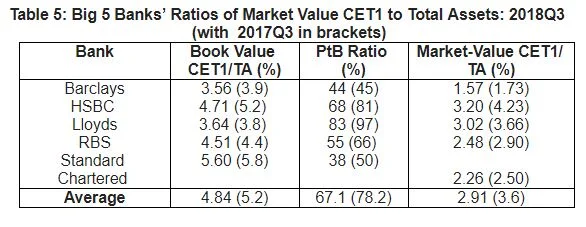UK banking system an accident waiting to happen
New report shows UK banks still sickly, nearly 12y on from run on Northern Rock
Latest round of Bank of England stress tests conducted in 2018 drastically underestimated the vulnerability of the UK banking system
UK banks are still highly leveraged and a major shock could cause the banking system to collapse
Had the Bank carried out its tests using market valuations of bank capital and appropriately high pass standards, then all major UK banks would have failed
Big 5 UK banks have issued over £34 of debt for every £1 of equity
Average Leverage of the Big 5 Banks has increased from 27.8 in 2017 to 34.4 in 2018
The Bank of England’s stress tests are worse than useless because they offer false risk comfort that leaves the economy needlessly exposed
The British banking system is an ‘accident waiting to happen’ according to a new report released today by the Adam Smith Institute, nearly 12 years after the run on Northern Rock heralded the beginning of the financial crisis.
Kevin Dowd, author of the report and professor of finance and economics at Durham University, says the Bank of England’s stress tests continue to greatly overstate the financial resilience of the UK banking system.
High bank leverage was a key contributing factor to the severity of the financial crisis and UK banks are still highly leveraged.
“In market-value terms, the big 5 UK banks have issued over £34 of debt for every £1 of equity. That’s an enormous level of leverage,” said Professor Dowd. “Indeed, the banks were in worse shape in 2018 than they were the year before. What we are seeing is retrogression.”
Market-valuations of bank capital are more reliable than book valuations and indicate that markets believe that banks are still carrying large hidden losses that are not reflected in book valuations or in the stress tests. And if the markets don’t believe the Bank of England, why should anyone else?
Like their predecessors, the central purpose of 2018 stress tests is to persuade us that the UK banking system is strong when the evidence indicates that it is not. The banking system is weak now, before any ‘worse than financial crisis’ stress scenario, not strong after one.
The free market think tank argues that stress tests are compromised by conflicted objectives, an inadequate number of stress scenarios, low pass standards, reliance on unreliable metrics and questionable modelling.
Had the Bank carried out its stress tests using market values and using more appropriate pass standards, then the banks’ true weakness would have been revealed. The ‘worse than useless’ stress tests provide the public with false reassurance about the financial health of their banks.
Professor Dowd suggests that the stress test programme is so severely compromised that it should be scrapped. Instead, the Bank of England should focus on the reforms really needed to get the UK banking system on its feet – raising capital standards, shutting down zombie banks, establishing tighter corporate governance and reforming accounting standards.
Kevin Dowd, senior fellow of the Adam Smith Institute and author of the report, said:
“The fifth set of Bank of England stress tests is about as useful as a cancer test that cannot detect cancer. The stress tests seek to demonstrate a financial resilience on the part of UK banks that simply isn’t there.
“The fact that UK banks are still weak after a long economic recovery is testimony to the failure of the Bank of England to perform its core job function and rebuild the strength of the banking system after the trauma of the crisis.
“The Bank of England constantly sounds a false alarm on Brexit but is hopelessly complacent about the banking system. It should stop its Project Fear nonsense and focus on what is should have been doing all along, fixing the banking system.
“Another crisis is a matter of time and neither the UK banking system nor the Bank of England are remotely ready for it.”
Matthew Lesh, Head of Research at the Adam Smith Institute, said:
“A little bit of knowledge can be a dangerous thing. The misleading conclusion of the Bank’s stress tests is serving to hide the underlying vulnerability in the sector. We heard that ‘everything is fine’ before the financial crisis - which resulted in hundreds of billions of pounds of taxpayer bailouts and economic and political effects that are still being felt today. We should be wary of allowing banks to maintain their highly leveraged position on the presumption that their risky behaviour will be bailed out by taxpayers."
Notes to editors:
For further comments or to arrange an interview, contact Matt Kilcoyne, Head of Communications,matt@adamsmith.org | 07584 778207.
The Adam Smith Institute is a free market, neoliberal think tank based in London. It advocates classically liberal public policies to create a richer, freer world.

